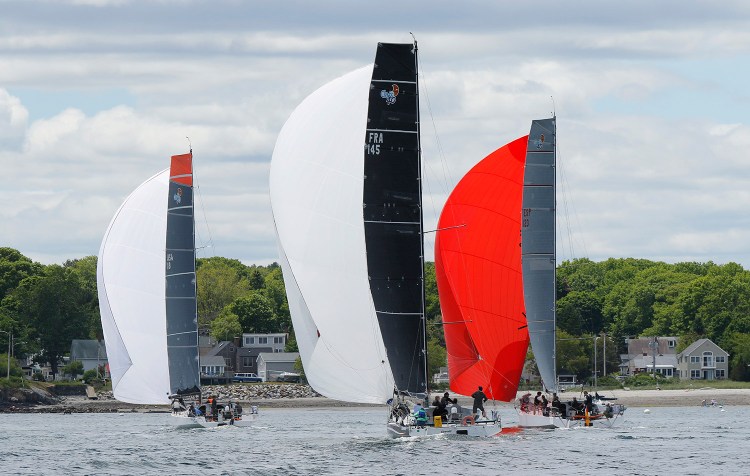When Atlantic Cup contestants raced into Portland last month, ending their 1,000-mile journey from South Carolina, eyes turned to the sleek boats, huge sails and podium winners. Few spectators noticed that one of the biggest winners in this year’s race was not even a formal contestant; it was the ocean and coastal environment.
Thanks to concerted efforts by the nonprofit Sailors for the Sea, races like Atlantic Cup have become “Clean Regattas” – no longer generating a damaging wake of discarded water bottles, picnic debris and toxic cleaners. Atlantic Cup, at the forefront of this trend since its formation in 2010, proudly calls itself “the most environmentally responsible sailing race in the U.S.”
Being wind-powered, sailing has an inherent advantage over many sports in terms of environmental impact – but it can still generate plenty of waste and pollution. To address this challenge, Sailors for the Sea was launched in 2002. Its sustainability director, Robyn Albritton, says that recently its “message has really begun resonating with the (sailing) community.” More than 900 Clean Regattas have been held to date, and 150 more are registered for this year.
Motivation can come, Albritton says, when sailors witness marine pollution first-hand and realize that their sport depends on a healthy ocean. Nowhere is this more evident than in the 2016 Summer Olympics, being held in August in Rio de Janeiro, Brazil.
News reports there, following water tests that revealed levels of viruses and bacteria from human feces that measured up to 1.7 million times higher than what would be deemed hazardous at a California beach. More recent news reports confirm that the 1,400 athletes competing in sailing, canoeing, swimming and rowing in Rio could be at risk.
Sailors in Maine rarely face such extreme environmental threats, but many have witnessed more marine debris than they care to recall. Clean Regattas offers a chance to turn that tide.
DISPENSING WITH DISPOSABLES
Molly MacMillan White helps run two Maine races – the Downeast Regatta and the J/24 North American – out of the Portland Yacht Club in Falmouth. Both races have made marked changes in recent years. In the past, White says, they generated a “huge amount” of waste, with countless disposable water bottles and five or six oversized garbage bags from each picnic or lobster bake.
Now each participant receives a single reusable cup for the event and can resupply that from water stations at the dock. Clearly marked containers encourage recycling, and picnic leftovers and compostable dinnerware are hauled off by Garbage to Garden – so trash generated from lobster bakes is down to about a tenth of what it once was. Each boat is given a Clynk bag to collect returnable bottles used while aboard.
Sea Bags Mobile Truck is on hand at the regattas to collect spent sails, keeping them out of landfills or incinerators. And participants are encouraged to join in a shore cleanup.
OFFSETTING CARBON GENERATION
Many yachts now rely on solar panels or hydro-generators to charge batteries, and some race organizers – like Atlantic Cup – require contestants to use renewable energy. Atlantic Cup does its part by supplying race boats with a 50 percent biodiesel mix to get from the docks to the race course, a practice that has been followed for four years without any mechanical issues.
Atlantic Cup achieved the highest “Platinum” level among Clean Regattas in part by committing to a completely carbon-neutral event. Organizers and participants track the carbon footprint of all their race-related activities, such as attendee travel and hotel stays. This process has proven educational not just for the sailors but for the communities where regattas are held. Before reaching Portland, Atlantic Cup racers had a stop in New York City, where organizers found that their trash traveled an average of 272 miles to reach a landfill!
When total carbon use has been tabulated, the Atlantic Cup purchases carbon offsets – this year through We Are Neutral. To compensate for the 2016 race’s carbon expenditures, this nonprofit will plant trees, help landfills capture methane emissions, and perform free energy retrofits on homes of low-income families.
ENCOURAGING OTHERS
Katie Hatch, executive director of SailMaine in Portland, runs regattas involving high school sailing teams, and sees more “peer-to-peer education” happening all the time. There’s even a group of high school seniors who reach out routinely to coaches and parents, educating them on the why and how of greener regattas. “The kids have become the messengers,” Hatch says.
Molly MacMillan White has found that most participants at their regattas embrace the new practices, and some return home motivated to make changes where they live. White is preparing a how-to manual to make it easier for race organizers to adopt more sustainable practices. “The whole point of this,” she says, “is to have it spread.”
Marina Schauffler, a freelance writer and editor, is online at www.naturalchoices.com.
Send questions/comments to the editors.



Success. Please wait for the page to reload. If the page does not reload within 5 seconds, please refresh the page.
Enter your email and password to access comments.
Hi, to comment on stories you must . This profile is in addition to your subscription and website login.
Already have a commenting profile? .
Invalid username/password.
Please check your email to confirm and complete your registration.
Only subscribers are eligible to post comments. Please subscribe or login first for digital access. Here’s why.
Use the form below to reset your password. When you've submitted your account email, we will send an email with a reset code.